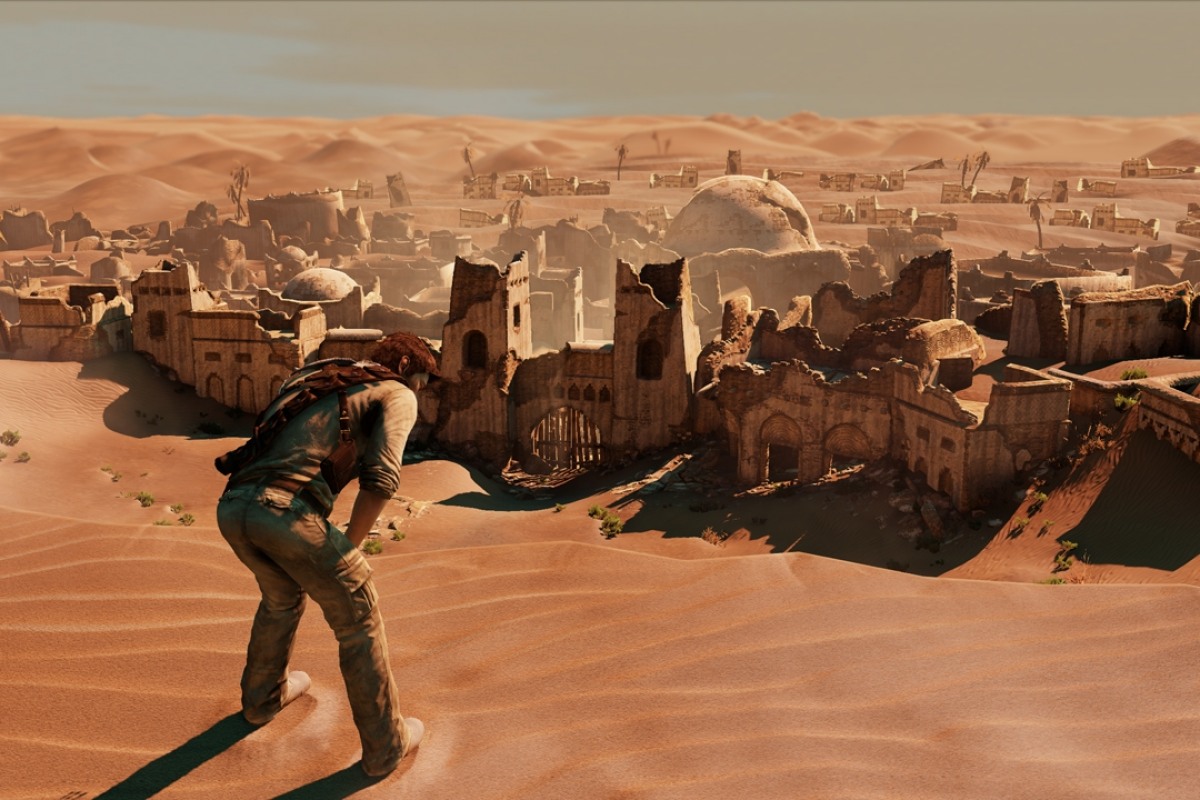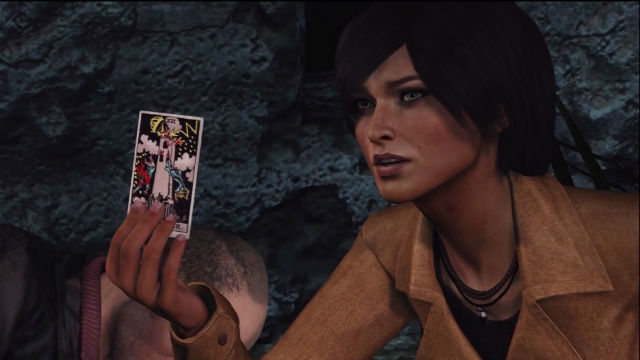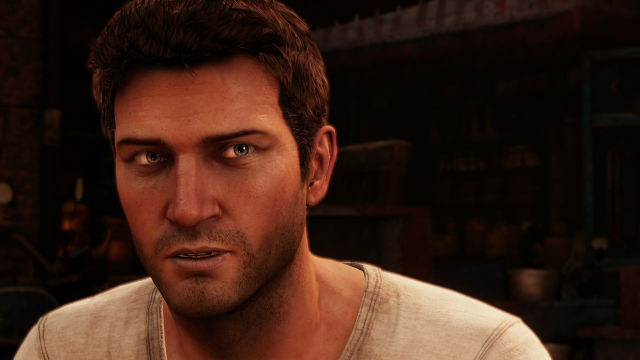This article is riddled with spoilers for the main singleplayer campaign for all three UNCHARTED games. You have been warned.
Naughty Dog’s third full instalment in the life of Nathan Drake has finally arrived to mostly very positive reviews and a slightly mixed fan reaction, so now I wish to wade in, dissect it and give my 2ps worth. My focus will be upon the story, characters and themes, and where Nathan and his chums are left when the dust has settled on their most recent adventure.
The subtitle of the game (‘Drake’s Deception’) caused a stir pre-release and its ambiguity was cause for some discussion. Which Drake? Is Drake deceived, or does he do the deceiving? We knew that the events of the story were to focus more heavily on Victor Sullivan and his relationship with the protagonist, and this led some, including myself, to suspect that the core deception would somehow involve these two; would we find out that Sully isn’t on Nathan’s side? Was he merely using Nathan’s exceptional skills ultimately for his own personal gain? Amy Hennig, Naughty Dog’s Creative Director told us that the theme of deception pops up time and time again; in fact even Nathan’s identity would be called into question.
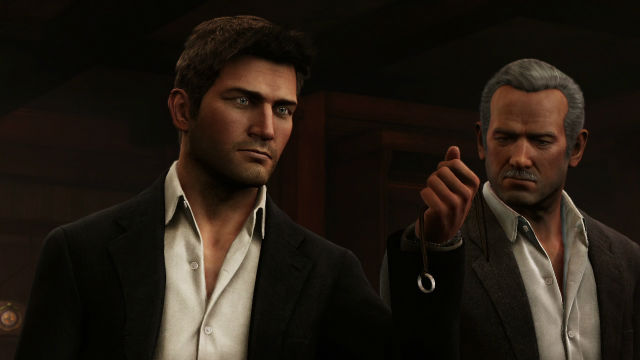
Is it real or fake?
Hennig was not winding us up. Deception runs through the the narrative like a streaker at a cricket match. Firstly, arguably the ‘core’ deception is perpetuated by Sir Francis Drake, our hero’s ‘ancestor’. The story goes that he spent six months on a part of his voyage that would normally take a sailor of his calibre a month. Of course Nate wants to know why; in the Uncharted world if it looks like there is a conspiracy or cover up; chances are there is one. However, in *this* case… yeah, ok, it is no different. The clues that were obscure enough (and covered up well enough) for anyone but Nate to solve led to Yemen and the Rub’ al Khali Desert, and ultimately to Iram of the Pillars; a city of immeasurable wealth.
“You headbutted me!”
However, the deceptions go deeper than this; even to the point of having us, the audience deceived. For example UNCHARTED 3; Drake’s Deception introduces to us new character; one Mr Charlie Cutter (played by Graham McTavish who bought Zoran Lazarevic to life.) Cutter is a tough bald headed Englishman who we first see beating the living daylights out of Drake.
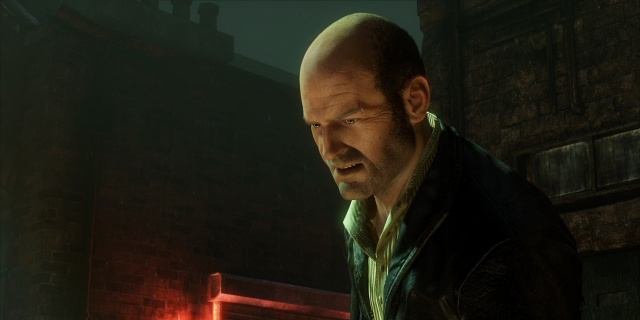
“Typical bloody yank…”
I think a lot of us thought (and a cleverly edited trailer and a Multiplayer beta side switch helped) that Cutter would be a typical bloody Brit. Which in American films, games… etc means ‘a Bad Guy.’ Think Sean Bean in National Treasure, Sir Ian McKellen in X-Men, Gabriel Roman in Drake’s Fortune… hell even Alan Rickman was (a superb) English Sheriff of Nottingham to Kevin Costners’s American Robin Hood. As it transpires, Cutter is (in my humble opinion) the most loveable addition to the cast of Uncharted Good Guys since the first game in the series.
However, Cutter does not exist merely to subvert a tired old stereotype. His looks and muscle are used by Drake and Co. to help ‘flush out’ Marlowe and her crew (who happen to be English…. baby steps, baby steps…(although in all fairness the plot almost requires them to be English)). His tough guy exterior is put to good effect here as it shows us that Nathan Drake and his allies are not adverse to using similar tactics as their enemies to get what they want. It is fine for Cutter to double cross Marlowe, but not for Harry Flynn to double cross Drake? Well, no it isn’t, but it made you think, didn’t it?
As with all the characters of Uncharted, Cutter’s presence also serves to bring out a different side to Nathan Drake that we have not yet seen, and that is that Nate. Doesn’t. Know. EVERYTHING. (“Who the hell is MacDuff???”) So far we have seen Nathan stumble through the world relying on his wits as much as fists and firearms, and his depth of knowledge always seemed somehow superhuman, except when the plot requires him to not know straight away. Think Borneo; Drake finds some more of Marco Polo’s writings in the excavation tent. He reads them, but doesn’t comprehend their meaning or relevance to the trail until the next scene, when the penny drops and he fills Sully (and by extension the audience) in. So although it isn’t going to affect the outcome of the game if Nathan doesn’t know who MacDuff is, but it does prove that Nate is actually human. Someone of his interlect should really know, and the fact that he doesn’t, highlights that Nate is very selective in his reading and learning. If I were to put it nicely I would call him ‘goal-oriented.’
Chloe and Cutter’s apparently abrupt departure approximately a third of the way the way through the narrative is, superficially, a shame (because Cutter is awesome) but realistically it was necessary. Cutter and Chloe gallivanted off to Syria ahead of Nate and Sully (who were busy navigating a burning Chateau) to find a piece of the puzzle. Had we lost Chloe (who serves not only as the “best driver in the business” but as a companion to Cutter) we would see Nate, Sully and Cutter go first to France and then to Syria, which would seriously alter the dynamic. As previously mentioned; this was a story about Nate and Sully. Much as I loved Cutter; he served his purpose, as did Chloe.
What we also get out of the inclusion of Cutter’s character and his limited screen time was a similar, yet more subtle and powerful effect than that of the untimely death of Jeff the Cameraman (yes that is his real surname) in UNCHARTED 2; Among Thieves. You’ve all played the game (and if you haven’t you are probably wondering what I am talking about) so I won’t go over the details, but before Cutter jumps, a tarot card is planted on him for Nate, Chloe and Sully to find. The card is The Tower; a basic interpretation of this would be the imminent collapse of a falseness that which was previously thought to be true. The organisation of which Marlowe and crew are a part uses deception, lies and fear to manipulate those that stand in their way. By planting the card they are not only suggesting that they had premeditated Cutter’s current predicament, but also that they are more than capable, and willing to do whatever they have in their power (in this case blurring the boundary between truth and lie) to get what they want. It also signifies a ‘rude awakening’ of sorts, when the truth is revealed.
Two more tarot cards play a prominent role in this section; The Magician, and The High Priestess. Cutter has the three cards in his notebook (it isn’t only Nathan that thinks to write stuff down, you know). The High Priestess is labeled as being Katherine Marlowe, and the Magician as being her right hand man; Talbot.
“I swear to God if there is a zombie around the next corner…”
This mysticism that is created by the secret society to which Marlowe and her cronies belong is all a part of the deception theme that underpins the game. We see Talbot apparently escape death following a bullet to the chest; we see him (or not) disappear from view and command agents with heads apparently aflame. However, all these elements can be explained without having to look to the supernatural. What Naughty Dog have done here is to break from their genre; mythical creatures, fictional beings and the down right weird are a staple of the types of plot that take you to a long forgotten part of Earth. This is a way of giving the audience some escapism but also something to aspire to.
During the final few scenes of the game Nathan fights flame headed Agents. Or at least he thinks he does. What he in fact fights are normal headed Agents but Nathan is actually tripping balls, and *thinks* their heads are on fire. Aficionados of the series might remember that Nathan has previously cited clowns as his number one fear. Should those Agents have clown heads? Afterall, the water that Nate drank to get into this state is meant to show ones fears. I’d argue not, as the ‘clowns’ comment was a throw away line that allowed Nate to, yet again, reveal nothing about himself, and yet still raise a laugh. Now, I am not doubting that Nate may have a real phobia of clowns, but the timing and the manner in which it was said made it a funny line, and not a serious one. Introducing clowns at the end of Drake’s Deception would totally ruin the seriousness of the current situation.
“History can be wrong, you know.”
Nathan Drake isn’t one to reveal a great deal about himself. Amy Hennig tells us in the extras gallery that she sees him as having ‘abandonment issues’, and it seems that one of the ways that he deals with these is through his witticisms. The ‘clowns’ statement being a good example of this. However, there is one thing that he is quick to tell everyone; in fact he told Victor Sullivan before even telling him his name; and that is that he is descended from Sir Francis Drake. It has always been touted that Nate at least believes himself to be a descendent of Drake’s, and up until now whether or not it is actually the case has never really been called into question. While the claim itself is a little farfetched it seemed that Nate had reasonable reason to believe it himself.
However, a spanner is thrown into the works, and it seems that one of the few things we knew for definite about Nathan (his belief, not the fact) is not true. At one stage in the game Katherine Marlowe has our hero in her clutches, and she spells out his past in a brutal, and ever so slightly heartbreaking manner. In a few sentences she strips Nathan of his entire identity. All Nathan can do is listen.
Drake is not Nathan’s surname; he was given to a boys’ home by his father aged five following his mother’s suicide. Interestingly the boys’ home is named St Francis. This is either a coincidence written into the narrative, or it tells us how Nathan came up with his assumed identity. Personally I find this slightly unlikely, although it is entirely possible. There is a theory that the name of the boys’ home inspired a young and impressionable Nathan to research into Sir Francis Drake, and he ended up using the name and making up the family connection. However this doesn’t quite work for me; St Francis, I can only assume, is St Francis of Assisi, and certainly isn’t Sir Francis Drake. Anyway, this isn’t entirely relevant, but in this short scene we learn more about Nathan than possibly ever before. While there is still a tiny chance that Nathan is who he says he is (albeit with a different (now lost) surname) or that he himself at least always believed it, it now seems likely that his entire identity was made up in order for him to escape the horrors of his own pitiful childhood.
The identity that Nathan created enabled him to aspire to what Sir Francis had been capable of; that which is instilled in his motto Sic Parvis Magna. Greatness from small beginnings. It isn’t a bad ideal to try to live up to, by any means. It is this, mixed with a little of what occurred during his first meeting with Marlowe that has apparently driven Nate to become the man he has become. Dismissed by Marlowe, aged 14, in Colombia as a “filthy, cast-off little beggar” he seeks to make something better out of himself. Twenty years have gone by, and it seems that he still isn’t quite over it. Marlowe points out that underneath the cocky exterior is the same runaway that she met two decades previously, and to be fair to her, she is probably right in her sentiment, if not her words. He *is* the same man; a name won’t change that. Some people may have tried years of therapy, but not Nathan. Elena hits this nail squarely on the head when she pleads with Nate to not go on with his quest, stating that he has successfully beaten Marlowe, as she doesn’t know where Iram is, but he does. This would not be great enough for Nathan.
“I did manage to save one small thing. I thought you might miss this…”
Nathan’s identity as a Drake is symbolised by the ring that he wears around his neck, and that we saw him steal from the Maritime Museum in Columbia. This game isn’t the first time that it has been used to symbolise Nate’s link to his (assumed) past. In UNCHARTED; Drake’s Fortune we see Nate leave it with the body of Sir Francis, believing that he “wasted his life for nothing”. It is Elena who retrieves it (although I still haven’t managed to work out how exactly) for him.
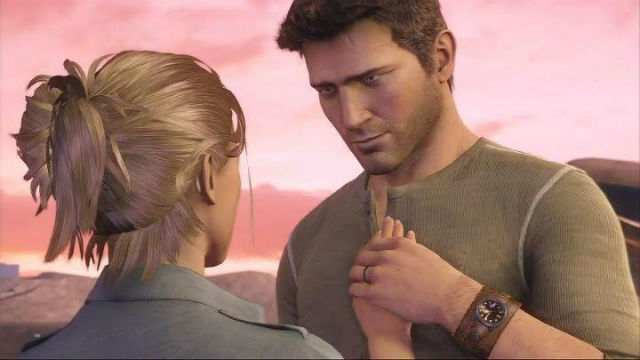
“I swapped it for something better.”
However it is used for even more poignant effect in Drake’s Deception. We learn just what happened to Nathan and Elena following their beautiful sunset mountaintop reconciliation at the end of Among Thieves. It seems the two lovebirds got themselves hitched! Who’d’a thought? Nathan? Settle down? Well… no he didn’t, by all accounts. Anyway, not only did they tie the knot, but they also went their separate ways. Elena Fisher and Nathan Drake have always worked as a duo, for me at least, because they *got* each other. Much as I love Elena there perhaps isn’t quite as much to get with her as there is with the ever complicated Nathan. But she seemed to understand his insatiable desire to adventure, whether or not she knew his real roots isn’t even relevant. Fact is that although she has always been the first to point out his quirks and flaws (“So let me get this straight; you are competing with a psychopathic war-criminal for a mythological gemstone?”) she has never tried to stop him doing what he does. Until now. We are not told explicitly which straw was the one that broke the back of the camel of their relationship but Nate being Nate seems to be the crux of the problem.
I can understand a need to settle, and to be normal, but I did not see Elena expecting this of Nathan. Emily Rose (Elena Fisher’s voice and mocap actor) comments that their relationship works when there is a lot of drama, but it is the mundane that really troubles them. I highly doubt that Nathan is blameless, probably quite the opposite, but I had hoped that they might be able to find something more of a compromise. Anyway, the point about the ring that I was going to make some paragraphs ago was that Nate loses it in Yemen (rather it is taken from him while he is drugged) and it is eventually lost for good when Katherine Marlowe meets her inevitable demise in the sink hole that is what becomes of Iram of the Pillars. Marlowe pleads with Nate to pull her out, she appeals to his heroic side, and offers up Drake’s ring as a reward for saving her life. Nate claims he now has nothing to prove; it seems he has finally become the man he has always wanted to be, and I can’t help feeling that Marlowe inadvertanty helped to facilitate this. By belittling him and writing him off as a child she was partly responsible for driving him to prove himself so hard. Having now beaten her to Iram, and followed in the footsteps of Drake himself he has more than proved what he can do. He does not need to hide behind the Drake persona anymore. But he is not a bad man, so in a vain attempt to pull Marlowe free the ring is lost.
One identity is symbolically sucked away, leaving a gap for another. This time it is his wedding ring that he puts back on. He is essentially rejecting the life of the adventurer in favour of the life of a happily married man. However, I do not see it lasting, if I am honest. Nathan is not a settler. Not even for Elena, in my opinion. Like Achilleus I cannot see him dying a normal death. This is why, although I am happy with the end of this chapter in his life, I would be disappointed with him if this is how his rambling life ends. I never want to see his death, but however the Uncharted series finishes I do hope it is left open for him to adventure for ever more. Of course, this does not bode well for Elena…
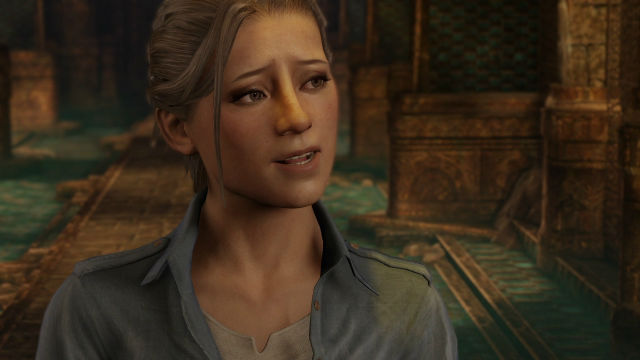
“On a scale of one to ten; how scared were you that I was going to die?”
Not that I am advocating that Elena should die, because… well… I love her, but if anyone were to pop their clogs it would make sense for it to be her. It would give Nathan the… scope… to adventure more. But I will leave that stuff for Naughty Dog to decide. I am sure they can come up with a better solution than conveniently killing a problem character off.
“I see great things in our future, kid. Great things.”
Clearly Nathan’s relationship with Elena has changed; for better or for worse, I am undecided; but his other significant other is Sully, and their relationship surely deserves a mention here. After all that is the basis for this game. I have variously heard their relationship described as a ‘bromance’ or as one that is like father and son. The latter sits better with me, and not just because Sully is twenty five years Nathan’s senior. A bromance, in my eyes, is what Joey and Chandler have, and touching and deep though that maybe, I don’t feel that the dynamic is the same. Sully, it would seem, took Nathan under his wing when they met back in Columbia, and although they have not always worked together, they always work *well* together.
UNCHARTED 3; Drake’s Deception is full of what could look like simple, witty throwaway lines put in for comedic effect. Case in point here is something Sully says while following Nate through the woods to the Chateau in France. In one of their reminiscing conversations Nathan says that he should have known he’d be in prison within a year of knowing Sully. Sully counters with “I got you out though. I always got you out.” This doesn’t indicate a particularly healthy relationship, but it does indicate an unfailing bond. The fact that losing Sully is Nathan’s greatest fear shows just what he means to Nate. From Marlowe’s summing up of Nate’s early life we can see that Sully is probably the first person to take much interest in him, or listen to what he has to say. For all his cocky wise-arse one liners Nathan is still a human being with feelings. Again I am reminded of Creative Director Amy Hennig’s use of the words ‘abandonment issues.’ Honestly it isn’t surprising.
As I said, Nate and Sully haven’t always worked together; for example Sully doesn’t really seem to know Chloe Frazer that well at the start of Among Thieves; Nathan clearly knew her biblically well. (Chloe represents the shadier side of Nathan, so I am not entirely surprised that Nate may have kept that part of his life separate from Sully.) Also Sully was quite happy to let Nate and Chloe gallivant off to Nepal while he went somewhere hot during the events of said game.
In the very first game we see Sully shot and survive, thanks to a luckily placed shirt pocket with Sir Francis Drake’s journal concealed within. Later Elena provides video proof of his seemingly miraculous survival, and she questions Nate on Sully’s trustworthiness. Although not 100% sure why Sully is helping out the baddies he claims that “Sully is a lot of things, but he isn’t a backstabber.” I think it is interesting that Nate doesn’t immediately recognise that Sully is merely helping them out (in fact he was leading them in the wrong direction) in order to keep himself alive, and for nothing else more suspicious. Nathan may know Sully very well, but he obviously doesn’t know everything about him. Judging by the depth of their relationship I highly doubt that Sully has ever given Nate a legitimate reason to suspect anything dubious, even if they aren’t completely inseparable.
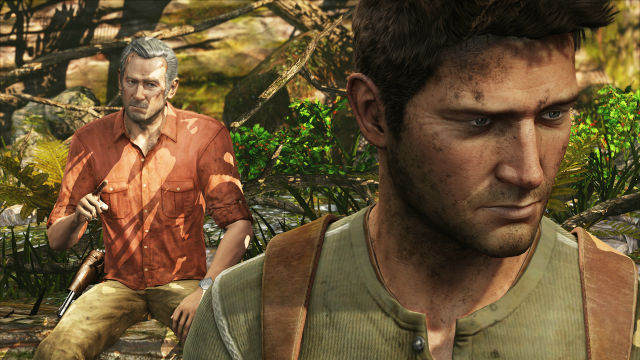
“I taught you better than that.”
Nathan may not have had reason to question Victor Sullivan, but this did not stop me from doubting him. Knowing that there were to be many examples of deception throughout the game I could not help but think that maybe Sully had not plucked Nate from the streets with good intentions after all. Katherine Marlowe makes this exact same point, but it was clear to me when Sully was prepared to shoot Cutter to stop him from killing Nathan that Sully was, and always would be, on Nathan’s side. All this considered, it is hardly surprising how much he means to Nate; for all his cocky exterior. I will go as far to point out that, to date, Sully is the only person to whom Nate has verbally expressed love. It was implied at the end of Among Thieves, of course, in relation to Elena, but the words were not used. They were used at the end of Drake’s Deception, though; to Sully. It was also this scene in which we see Sullivan openly all but claim Nathan as his own son. The paternal/filial nature of their relationship has often been pointed out, but here it is spelled out. What initially drove Sully to help Nate out is open for debate; maybe he initially *did* see something he could exploit, maybe he just saw a boy who could really use a friend, and that was the only way he knew to show him friendship.
All this aside; they have never shared a work ethos. Sure, Nate is interested in the money, but ever since his jaunt to the museum in Cartegena his motivation has been, very loosely, historical knowledge. He did not steal the ring to sell it, he stole it as it symbolised his ‘past’. Sullivan, on the other hand is all about the money. He is forever trying to hurry Nate up; telling him to get to the point, etc… This isn’t to say he is wholly uninterested, but clearly the “immeasurable wealth” is what keeps him *really* interested. There is a nice moment in Drake’s Deception in which Nathan is explaining in his usual excited and oblivious manner the intricacies of their current case to Sully, Chloe and Cutter, and is slightly blind-sided when Sully pre-empts him by recognising the Sabaean alphabet. Sully and Chloe share a fist bump which goes wholly unnoticed by Nathan who is in his element. They may be two very different people, but they certainly make a great complementary team.
“What’s the matter? Doesn’t the kitty like getting wet?”
I alluded to the fact that this game has been met with mixed reactions from the audience. I will agree that there are some technical issues that sadly hold it back from perfection; occasionally Nate’s leg will go through a wall, for example. I can assign these to the fact that the PS3 isn’t quite good enough to allow the game to be all it can be. Were it a PS4 title, I am sure none of these issues would be even remotely evident.
What I have found, though, is that the story and narrative have come in for some criticism. Playing the game through for the first time had me hooked. I took a very short break to post to twitter to say that I found the story dark and compelling and was flabbergasted to find other people may have thought otherwise. I wondered if the games we had played were the same. However the audience is so massive that there are those that want to shoot, and that is fine, but there are also those that want to be told a story and to explore the characters and themes. Catering for everybody is no easy task. The narrative of UNCHARTED 3; Drake’s Deception does not always instantly offer up answers but they are there, if one looks hard enough. We may not know, for example, exactly how Talbot got away from Nate, Sully, Cutter and Chloe, but there are several plausible theories. And revealing just how it was done would defeat the object of the secret society’s mysteriousness.
UNCHARTED 3; Drake’s Deception is different from many games, in that it not only tells you a story, but also lets you experience that story. Many games allow you to assume a character; this game doesn’t. You ‘play’ as Drake. He has his own personality so there is no need to imprint your own onto him. So how, then, does one create a game with him which allows the player any amount of input? Simple; show them how Nathan feels, what he thinks, what makes him tick and what he gets out of bed for. Scenes that are not action-oriented are vital to a game such as this. The player may simply have to push their stick forward to see Nate stumble through a desert, but they are rewarded with a depth of feeling and emotion that I rarely get from television or film. In fact, it is *because* you hold the controller that you feel so involved and drawn in. People (the uninitiated) sometimes ask me what it is that I see in Nathan, and express surprise at the thought that a videogame character (gasp) can inspire so much. Sometimes if I am feeling flippant I will answer with this image;
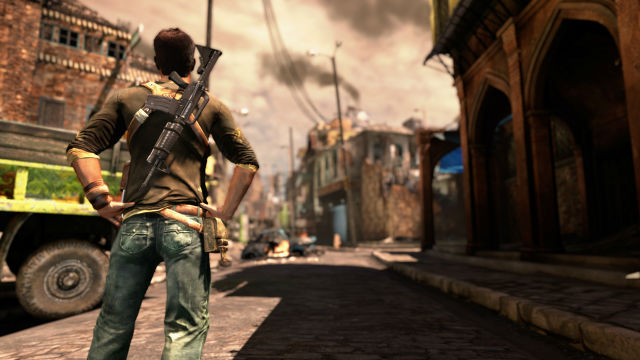
Yes, I went there.
…but most of the time I tell them it is because I can really get to know him, without really knowing him at all. He is a fascinating man, who operates not quite in our world, yet close enough to it that we can be drawn in to his.
Superficially, Drake’s Deception is a story about a search for a lost city. What it actually is, among other things, is a study on what makes Nathan Drake who he is. And that certainly isn’t his name. He has come a long way in the timespan of this game. Yet again, though, he is not a penny richer, yet he is richer in spirit. He is free to continue doing what he does (domestic arrangements permitting) as himself. After all a name alone does not make a man. Sullivan was right; greatness is what you do with the hand you have been dealt. Nathan has more than proved himself to be more than the man he ever set out to be.

